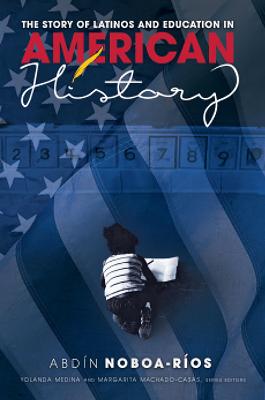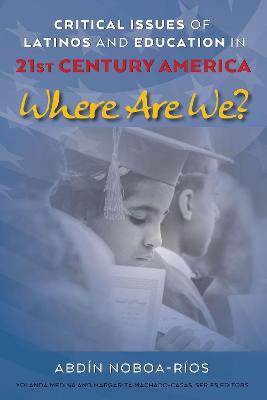Critical Studies of Latinxs in the Americas
2 primary works
Book 21
The Story of Latinos and Education in American History
by Abdin Noboa-Rios
The 2014-2015 academic year marked the first year that American, preK-12 public school enrollment became majority nonwhite, with Hispanic/Latino as the largest minority. Population shifts have continued to occur, with Latinos now representing 28% of public school students.
American public schools are in trouble, with national achievement reaching new lows and progress for nearly two-thirds of all 4th and 8th graders below proficiency levels and stagnant for years. According to the Nation's Report Card, students of color rank lowest, with Latinos and African Americans consistently at the bottom.
To understand the history of Latinos in particular, The Story of Latinos and Education in American History goes back in time to recreate the story. In this book, Dr. Noboa-Rios relates the dark legacy before and after Plessy, as well as the post-Brown challenges that linger. For a better and more balanced future for the nation, America's challenge is to ensure that Latino students excel. Understanding how and why this dark history has occurred is imperative to rectify the situation.
Book 24
Critical Issues of Latinos and Education in 21st Century America
by Abdin Noboa-Rios
The year 2011 marked the first time in U.S. history where more nonwhite babies were born than white babies. Academic year 2014-15 marked the first year that K-12 public school enrollment became predominantly nonwhite. Among the five largest school districts, Latinos represent the predominant group. It's all about a stemming population shift, not immigration, as more Anglo-Americans are dying than those replaced by births.
Meanwhile, our public schools are in trouble, where "normalized failure" has become the new norm and international achievement has reached new lows. In this mix, Latinos are 1-in-3 newborns. As the future of America is now "inextricably linked" to the fate of these children, our educational system must be more responsive or the nation is imperiled.
For this book, Abdin Noboa-Rios interviewed 112 prominent educators nationwide, including some of the best Hispanic educators and thought leaders to search for answers to America's educational challenges. What do they say? What do these leaders see? What can we learn? Their many suggestions and concerns are well highlighted. For these leading scholars and practitioners, their views are more about basic renewal, not piecemeal reform. Such action requires fundamental shifts in both mindset and attitude. Appeasement misses the point. We cannot undermine the severity of the problem.

